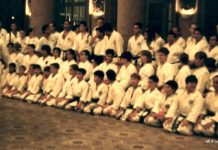Looking for martial arts schools in your area. Visit the Martial Arts Schools Directory
Joining a martial arts school is a lot like purchasing a used car: You don’t always know what you are getting until it’s too late.
In the marketplace of martial arts, all schools are not created equal. Martial arts teachers generally do not have to answer to a state regulatory commission or a government agency, and there is no consumer group to act as a watchdog to ensure the quality of instruction. Anyone, in fact, can acquire a business license, purchase a black belt, rent studio space and, to the unwitting public, appear to be the second coming of Bruce Lee.
How, then, can the discerning buyer make a knowledgeable choice when it comes to martial arts instruction? By shopping around. Like any other product, there are certain criteria that make some martial arts studios more appealing-and legitimate-than others.
Unfortunately, most first-timers-and some veterans-have a difficult time seeing past the price tag or the convenience of location when choosing a martial arts school. Those should not, however, be the only determining factors when deciding on a school. It is vitally important to visit as many schools as possible before committing to one. See what each school has to offer, then make your decision.
More often than not, classes are taught, not by a school’s master, but by an assistant instructor or adult black belt. Be sure you know before enrolling how available the master instructor will be to help you with your learning.
The first thing to do is make a list of the martial arts schools within your acceptable travel distance and your preferred style (if you have one). Then make an appointment to watch both beginning and advanced classes. If the school offers a free introductory class, take it.
The following are factors that should all be weighed before you sign on the dotted line.
Attitude
The attitude of both the instructor and the students can serve as an accurate indicator of school spirit. Instructors who treat their students with little respect, yet demand it themselves, may be on an ego trip. Student respect and discipline can be forced or natural; watch how the students react when the instructor is not within sight. If they step languidly through the motions or chat with one another, their previous show of respect and discipline was a facade. Hopefully, the students diligently continue with their drills in the instructor’s absence.
Warm-Ups and Cool-Downs
Stretching before class is important and necessary to prevent injuries. Check and see if the instructor at your prospective school conducts such warm-up drills before classes.
Warming up is essential to a martial arts workout. Stretching is especially important, since there is a good chance you will be performing kicking drills and could injure muscles or ligaments that are not properly conditioned. A short “cool-down” workout after a vigorous training session is also recommended. By visiting a school, you can discover whether these facets are included in the training.
Location
A school’s proximity to your home or work should be taken into consideration prior to signing up. Although an hour commute to class might not seem too bad at first, keep in mind that you will be making that drive two-to-three times a week for the next several years. Find a school that fits your needs, but is also within an acceptable driving distance.
Equipment and Facility
Martial arts schools vary in the type of equipment and amenities they offer. Some are large and modern, and pro- vide weight-training equipment, showers and lockers, while others do not. It is up to you to decide what is most important and necessary for your training. All schools should offer basic comforts, adequate equipment and learning essentials. Remember: A pretty school isn’t necessarily a highly functional school, and vice versa.
Styles
Ask instructors about the size and composition of classes before signing up for lessons. Adults may not want to be in the same class with children, some of whom may be able to perform the techniques better than their old counterparts.
Most instructors recommend starting with one type of martial art and learning its essentials before trying another style. However, many martial artists like to be exposed to a variety of styles, and compare them to their own, instead of focusing on one art. There are schools that offer both types of training; you must decide which method you prefer. Ask instructors about the size and composition of classes before signing up for lessons. Adults may not want to be in the same class with children, some of whom may be able to perform the techniques better than their old counterparts.
Class Sizes and Schedules
Many new students prefer to be part of a large training group, rather than a small class. However, the benefits of a smaller class should not be overlooked. In a smaller class, you will likely receive more individual attention from the instructor, and there is less of a chance of becoming “just a number.” If you prefer private, one-on-one lessons with the chief instructor, that can usually be arranged.
You should also check with the instructor about what time of day classes are offered, as well as their duration. Some schools offer 90-minute classes, but most seem to be an hour long. Decide what length you would be most comfortable with before committing to a school that offers classes that are either too long or too short for your tastes.
Quality of Instruction
The attitude of both the instructor and the students can tell you a lot about a school. Respect and discipline can be forced or natural.
If the school is headed by a well-known martial arts master, many prospective students mistakenly believe they will receive their instruction from this individual. Such is rarely the case, however. More often than not, classes will be taught by an assistant or high-ranking students at the school. That’s not to say these individuals are not fully qualified to teach, but a prospective student should ascertain ahead of time who will be doing the instruction, and how available the master instructor will be to help you during the course of your learning.
Class Age Groups
Check to see if classes are separated by age and/or belt level. Adult students may not appreciate training with second-graders, some of whom may be able to execute the techniques better than they can. You may find yourself as the only adult in a class full of much younger students, and the different maturity levels could prove distracting to both you and them.
Ranking
Your chances of receiving one-on-one insruction from the teacher are increased when you attend a small martial arts school.
Some martial arts instructors are in business simply to get your money and could care less about your progress in the art they teach. To discover if this is the case, ask the instructor about his belt ranking system. If he says you need to be proficient in a certain number of basic movements, forms, sparring and self-defense techniques before he will promote you to a higher belt level, you are likely dealing with an honest teacher.
If, on the other hand, the instructor tells you that you will receive a new belt every two months, be wary. You should never move up in rank until you are ready and qualified to do so. A good instructor does not push students to move up in rank merely to receive a belt-testing fee.
Size of School
Martial Arts schools come in all sizes. Some are part of a large chain, others are small operations run by a single instructor. The quality of instruction you will receive at a school is not necessarily related to its size. You can receive both poor or excellent instruction at a small school, and the same goes for large schools. Although large schools may have better equipment and a nicer facility, smaller schools offer students more personal attention from the instructor(s). Check out both types during your research.
Price of Instruction
Rarely do martial arts schools advertise their price of instruction in the phone book. Prices could be determined on a monthly basis, over several months, or by how often you train each week. In some cases, the price is negotiable depending on how many people will be taking classes with you (family package deals, for example). There are instructors who charge as little as $50 dollars a month for instruction, and there are those who garner $50 or more for a single one-hour session. It is up to you to determine what you feel is a fair and manageable price for instruction. After some research, you will know who is asking too much.
Just because a school is small and training is conducted in a spartan environment doesn’t mean the instruction is not top quality. Good martial arts schools come in all shapes and sizes.
There are countless other minor details to consider when choosing a school. Is the school clean? A clean school is a sign of pride and respect.
Is the instructor receptive to your questions? If you are treated like an annoyance when trying to find out about the school, you will probably be treated like an annoyance while you’re taking classes. Conversely, if the instructor seems too eager to sign you up and answers with rehearsed responses, a warning light should go off in your head. Does the school have air-conditioning and/or heating? Seems like a silly question until it’s sizzling or freezing out- side.
All of this may sound like a lot of work simply to find a place to take martial arts lessons. But if you are planning to invest hundreds of dollars and hundreds of hours in martial arts classes over the next few years, don’t you want to be sure of what you are getting in return? If you make a list of the things you feel are important, and check off those items as you visit prospective schools, you will find that your choices are quickly narrowed. Before long, you will be performing martial arts drills at a school that is right for you.
by Edward A. Aymar, C. Renee Beveridge and Jim Coleman
About the authors: Edward A. Aymar is a Fairfax, Virginia-based freelance writer. C. Renee Beveridge is a Driftwood, Texas-based martial artist and freelance writer. Jim Coleman was the executive editor at Black Belt magazine.
Looking for martial arts schools in your area. Visit the Martial Arts Schools Directory







